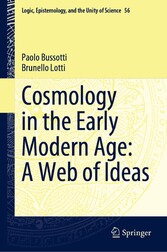Suchen und Finden
Service

Cosmology in the Early Modern Age: A Web of Ideas
Paolo Bussotti, Brunello Lotti
Verlag Springer-Verlag, 2023
ISBN 9783031121951 , 328 Seiten
Format PDF
Kopierschutz Wasserzeichen
Geräte
This volume addresses the history and epistemology of early modern cosmology. The authors reconstruct the development of cosmological ideas in the age of 'scientific revolution' from Copernicus to Leibniz, taking into account the growth of a unified celestial-and-terrestrial mechanics. The volume investigates how, in the rise of the new science, cosmology displayed deep and multifaceted interrelations between scientific notions (stemming from mechanics, mathematics, geometry, astronomy) and philosophical concepts. These were employed to frame a general picture of the universe, as well as to criticize and interpret scientific notions and observational data.
This interdisciplinary work reconstructs a conceptual web pervaded by various intellectual attitudes and drives. It presents an historical-epistemological unified itinerary which includes Copernicus, Kepler, Galileo, Descartes, Huygens, Newton and Leibniz. For each of the scientists and philosophers, a presentation and commentary is made of their cosmological views, and where relevant, outlines of their most relevant physical concepts are given. Furthermore, the authors highlight the philosophical and epistemological implications of their scientific works. This work is helpful both as a synthetic overview of early modern cosmology, and an analytical exposition of the elements that were intertwined in early-modern cosmology. This book addresses historians, philosophers, and scientists and can also be used as a research source book by post-graduate students in epistemology, history of science and history of philosophy.
Paolo Bussotti is Associate Professor in History of Science and Techniques at the University of Udine (Italy). His research areas are history of science and mathematics, in particular history of geometry and number theory between the 17th and the 19th centuries, and history of physics and astronomy in the 17th century. He is the author of more than 100 scientific publications, among which a monograph on the history of the method of infinite descent (number theory), From Fermat to Gauss. Indefinite descent and methods of reduction in Number Theory (2006) and one on Leibniz's planetary theory, The complex itinerary of Leibniz's planetary theory (2015). He is the co-author (jointly with prof. R. Pisano) of many papers on the Geneva Edition of Newton's Principia published in important journals dedicated to the history of science. He is reviewer for leading scientific journals as the Zentralblatt für Mathematik.
Brunello Lotti is Associate Professor of History of Philosophy at the University of Udine (Italy). His research interests on early modern British philosophy focus on the relations between natural philosophy, metaphysics and theology, including the history of platonism, the reception of Cartesian scepticism and mechanicism, and the issue of the origin of motion. He is author of the monographs Ralph Cudworth e l'idea di natura plastica (2004), L'iperbole del dubbio. Lo scetticismo cartesiano nella filosofia inglese tra Sei e Settecento (2010), 'Spiritus intus alit'. La ricezione di un luogo filosofico virgiliano nel pensiero moderno (2021). He coedited Scienza e teologia fra Seicento e Ottocento. Studi in memoria di Maurizio Mamiani (2006), and Eredità cartesiane nella cultura britannica (2011). His articles and essays cover several authors in early modern British philosophy, from the Cambridge Platonists to Locke and Berkeley.
Shop


